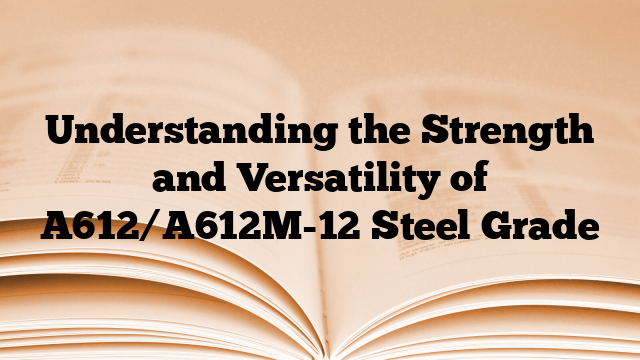The A612/A612M-12 steel grade is a low carbon, high strength, and versatile steel that is commonly used in pressure vessel applications. It is specifically designed to withstand high levels of pressure and temperature, making it suitable for use in a wide range of industries, including oil and gas, chemical, and power generation.
The chemical composition of A612/A612M-12 steel grade is as follows:
– Carbon (C): The carbon content in this steel grade is typically low, ranging from 0.25% to 0.28%. This low carbon content helps improve the weldability and formability of the steel, while maintaining its strength.
– Manganese (Mn): The manganese content in A612/A612M-12 steel grade is relatively high, usually ranging from 1.00% to 1.80%. Manganese is added to enhance the strength, hardness, and wear resistance of the steel.
– Phosphorus (P): The phosphorus content in this steel grade is limited to a maximum of 0.035%. Phosphorus can cause brittleness and reduce the toughness of the steel, so keeping the phosphorus content low helps maintain the desired properties of the steel.
– Sulfur (S): Similar to phosphorus, the sulfur content in A612/A612M-12 steel grade is limited to a maximum of 0.035%. Sulfur can cause hot cracking during welding and negatively affect the steel’s ductility, so minimizing the sulfur content is important.
The A612/A612M-12 steel grade exhibits excellent mechanical properties, which contribute to its strength and versatility. Some key mechanical properties of this steel grade include:
– Yield Strength: The yield strength of A612/A612M-12 steel grade is specified to be at least 345 MPa (50 ksi). This indicates the minimum stress level at which the steel will permanently deform and lose its elasticity.
– Tensile Strength: The tensile strength of this steel grade is specified to be in the range of 550-690 MPa (80-100 ksi). This represents the maximum amount of stress the steel can withstand before failing under tension.
– Elongation: The elongation of A612/A612M-12 steel grade is specified to be a minimum of 22%. Elongation is a measure of the amount of plastic deformation the steel can undergo before fracturing, and a high elongation indicates good ductility.
– Impact Resistance: A612/A612M-12 steel grade exhibits good impact resistance, which means it can withstand sudden loading or impact without fracturing. This property is essential in pressure vessel applications where the steel is subjected to high-pressure conditions.
The A612/A612M-12 steel grade is governed by the ASTM A612/A612M standard, which specifies the requirements for this particular steel grade, including its chemical composition, mechanical properties, and manufacturing processes. This standard ensures that the steel meets the necessary criteria for its intended use, providing guidance for manufacturers, engineers, and end-users.

